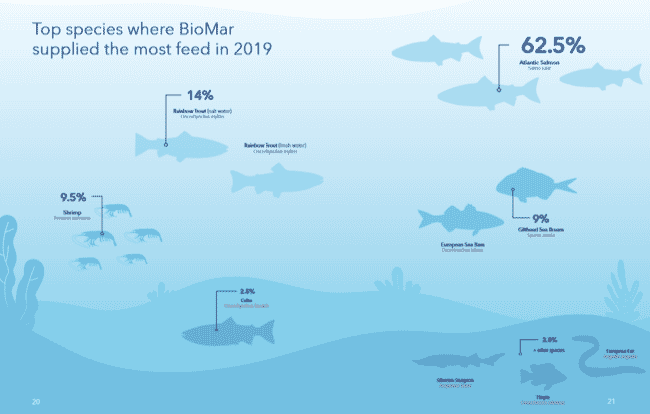
© BioMar
This figure indicates the overall quantity of wild caught fish used per quantity of cultured fish produced and is one of the key findings revealed in BioMar’s Integrated Sustainability Report for 2019, which has been released today.
“Although it seemed unlikely that it would be possible to achieve a great FIFO ratio every year, due to ever changing market conditions. We see that by embedding a sustainability mindset in our culture we have been able to achieve this impressive milestone while still delivering on our financial results,” said Carlos Diaz, CEO of BioMar Group, in a press release.
BioMar, which made gross profits of over $1.4 billion in 2019, supplies feed to more than 45 different species, to over 80 countries from 16 factories. The report shows that 51 percent of their raw materials were plant-based dry matter, 9.2 percent marine oils, 17.1 percent marine dry matter, 6.3 percent land animal ingredients, 14.2 percent plant oils and 2.2 percent "micro and other" ingredients.
However, the report emphasises the company’s focus on increasing the proportion of novel ingredients used in its feeds.
“Only with the wider adoption of novel ingredients in sustainable feeds will these products become cost competitive and mass market scale can be achieved. We see a future where seafood from aquaculture will be seen by consumers as the sustainable protein choice for the good of the planet,” stated Vidar Gundersen, BioMar’s global sustainability director.
BioMar is currently reporting more of its community and society activities, as the United Nations (UN) Sustainable Development Goals clearly state that sustainability goes beyond your own products and operations.
“We have always believed that education and knowledge exchange is the key to driving long term sustainable development and we are proud to this year add to the report our achievements in these areas. Later this year we will review our corporate KPIs with the intention of setting ambitious targets that will continue to drive us even further”, stated Diaz.
Gundersen explains why setting ambitious sustainable development targets are important.
“We are now entering the decade of ocean science as declared by the United Nations, and this year’s report highlights the importance for good stewardship and management of our oceans. We see the wider adoption of novel ingredients as being important for achieving this. We are also taking transparency and traceability one step further and our partner Orivo recently launched a solution for DNA-based authenticity of marine products which we already have implemented to our quality procedures”.
The World Resources Institute recently pointed to the use of sustainable aquaculture feeds as one of their top five ways of Creating a Sustainable Food Future and BioMar has recently joined the advisory board for the High-Level Panel for A Sustainable Ocean Economy, along with the UN, 14 serving government leaders and other business leaders.


